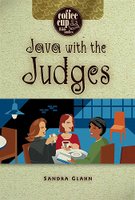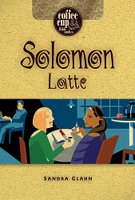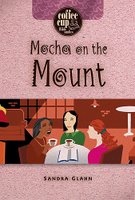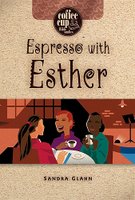Captain’s Log, Stardate 08.28.2006
I met Sandra Glahn at ICRS in July and was immediately fascinated by her Coffee Cup Bible Study series. I mean, coffee and Bible study! What’s not to like?
Sandi has four awesome Bible study books:




JAVA WITH THE JUDGES, SOLOMON LATTE, MOCHA ON THE MOUNT, and ESPRESSO WITH ESTHER.
And now, here's my interview with Sandi!
What is the theme of the Coffee Cup Bible Studies? How did you come up with it? Who did you write these studies for?
I call them Bible Studies for Women on the Go because I wrote them "for smart girls with full schedules."
I taught Women's Bible Study at my church on and off for about ten years, and I designed my own, based on what I needed/wanted in a Bible study. It needed...
...to go deep--not Bible study lite--but without getting too complex or cerebral.
...to be physically small enough to throw in a purse or diaper bag.
...to contain the complete Bible text being studied (I used the NET Bible at www.bible.org) so participants wouldn't have to carry a Bible AND a workbook to the doctor's office or car repair shop when snippets of "spare time" present themselves.
...to have focused, active study Monday through Friday but passive devotional/applicational reading on the weekends, when the change in routine (school for kids/work for spouse) contribute to our neglect of devotions.
...to be designed for both group and personal study.
...to have both a book and a spiral binding so women could use it on the treadmill or write in it without having it flipping shut on them.
...to assume a smart reader and explain key Greek and Hebrew terms without requiring a foreign-language dictionary.
...to study blocks of text or entire Bible books rather than being topical, so participants could see the entire flow of thought from an author. (As an author, this was particularly important to me.)
...to include interaction between the text and all five senses rather than appealing to visual learners only.
...to include supplementary web site resources (aspire2.com and soulpersuit.com) for artists wanting to interact creatively with the text, readers wanting to know about movies or novels based on the text, and even stuff like recipes for Purim, which come with the Esther study.
...to include prayers written in the text and Bible memory verses selected for each week.
And finally, it had to include the "theological" step of Bible study. That simply means when I read something like "slaves obey your masters," I do not automatically translate it to my own day as "employees obey your employers." Instead, I see that the world at the time the command was written to educated slaves living as members of households without the option of freedom. A U.S. employee is an equal with the employer in that he/she can legally walk off the job any time; a Greek slave had no such freedom and was not an equal. When I place myself under an equal, it's called submission; when I place myself under someone in authority over me, it's called obedience. The theological step is often left out of women's Bible studies, and it simply means that you find what is truly timeless in the text before seeking to apply it.
Chip MacGregor, who was my agent at the time, shopped the series to a bunch of publishers, and three nibbled. AMG was the only one that agreed to let us do it entirely as proposed, so we forged a deal.
Will there be more books coming in the series?
That's the plan. We now have Mocha on the Mount, Solomon Latte (the R-rated Song of Songs), Espresso with Esther, and Java with the Judges, and we have in the works additional studies on Colossians and Ruth.
Tell us a little bit about your blog.
It's www.aspire2.blogspot.com. ASPIRE started out as an acrostic for Adoption, Sexual Intimacy, Pregnancy Loss, Infertility, Reproductive Technologies, and Ethics. They were the topics on which I had done the most living (ugh), research and writing--both fiction and non-fiction. In addition to the Coffee Cup Bible Study series, I have coauthored seven books with William Cutrer, M.D.--two on infertility/pregnancy loss, one on sexual intimacy, one on a biblical exploration of contraception, and three medical novels--the Christy-award finalist, Lethal Harvest; its sequel, Deadly Cure; and False Positive. The blog started out as a platform for discussing issues relating to reproductive technologies (I had seven miscarriages and three failed adoptions before we adopted our daughter). But after I graduated from seminary I also started teaching writers in the media arts program at Dallas Theol. Seminary (DTS), so the blog includes writing links and rants. And I teach a class at DTS on the Role of Women in Ministry, so I comment on issues of interest to women as well.
Finish this sentence: Writing a Bible study is like ...
...handling explosives. You have to respect what you're working with. In Annie Dillard's oft-quoted observation about Christ-followers she wrote, “On the whole, I do not find Christians, outside of the catacombs, sufficiently sensible of conditions. Does anyone have the foggiest idea what sort of power we so blithely invoke? Or, as I suspect, does no one believe a word of it? The churches are children playing on the floor with their chemistry sets, making up a batch of TNT to kill a Sunday morning. It is madness to wear straw hats and velvet hats to church; we should all be wearing crash helmets. Ushers should issue life preservers and signal flares; they should lash us to our pews.” The living Word is sharper than any two-edged sword, and handling it requires some serious accountability. I had to constantly repent of hypocrisy as I challenged readers to eschew their own materialism or to weep over their own sin.
Do you have a favorite scripture verse for your writing?
Yes, Proverbs 14:4 - Where no oxen are, the manger is clean/But much increase comes by the strength of the ox.
Sometimes you have to clean up a mess to get the results you want. You have to take some risks.
What is your favorite coffee drink?
Definitely Hazelnut Belgian Cafe. My husband brings it to me boiling hot in bed every morning. The same antibody problem that caused our decade of infertility and pregnancy loss makes me wake up stiff every morning. I loosen up slowly. I told him once that if he goes before I do, I'll cry every morning when he's not there to bring my coffee, and he said he'd leave an endowment to pay someone to do it. (Yarright. But it was sweet, huh?)
I should clarify that readers of the Coffee Cup Series don't have to be coffee drinkers. They don't even have to LIKE coffee. They can drink tea. Or hot chocolate. Or iced tea. Or water. Whatev. The idea was just to sit down for a few minutes like you would with a cup of the bean mix and meditate on what God has to say.
Some of my readers like the spiral binding because it's convenient for using on the treadmill. Someone even suggested I title my next study, "Ripped with Ruth."
You may (or may not) know that my husband, Captain Caffeine, bought a very expensive espresso machine and coffee grinder when I got my book contract (it was part of our agreement when I decided to quit work for a few months to write full time. Contract = espresso maker). Do you enjoy espresso? Make it at home, honing your barista skills?
Good for him! If you know Mary DeMuth, she and her husband, Patrick, are good friends. And Patrick makes a mean cup of espresso with the fancy machinery. But my husband and I cheat. We use the instant stuff from International Coffees. Isn't that cheesy? But it works for us. I do like to go to Starbucks sometimes and get a tall non-fat cafe mocha, no whipped cream. Okay, sometimes they forget and put in the whipped cream anyway, and I do NOT take it back. :)
Do you have a favorite coffee/espresso shop and/or barista?
I live in Mesquite, Texas, a 'burb of Dallas, and we have a new coffee shop in town that's privately owned. In general I prefer restaurants and coffee shops that have an owner you can get to know rather than the big chains. But my fave cuppa is the one I drink every morning while propped up on two pillows. When I was in the hospital with a broken clavicle last year, my husband even brought me my coffee in bed there. The hospital brew was rank, and here came my man of twenty-seven years with my steaming drink. He's the bomb.
What's your favorite munchie when you're drinking coffee? (Camy is partial to buttery scones)
I like blueberry muffins, but scones sound good. No, great. I'm willing to convert.
Okay, you're off the hotseat! Any parting words?
Sure. The whole concept of everyday folks studying the Bible daily developed after the invention of the printing press. For most of the church's history, individuals did not have readable copies of God's word (nor were most people literate). So the idea that we have to have our Bible reading at a set time daily sometimes becomes a point of legalism, something to strike off the "to do" list rather than meditating "day and night," as the psalmist wrote. On the other hand, in an oral culture, which was the world at the time both Testaments were written, people had long sections memorized--something we've lost. When Jonah got stuck in the belly of the big fish, he prayed phrases from Psalms that he had hidden in his heart. Today what we have gained in resources, we have lost in memorization. So we need to make it a priority to have regular intake of God's word to compensate for what we don't have committed to memory. But it should come with caveat lector: Handle with care!
Camy here: Thanks for being here with me, Sandi! I can't wait to dig into my own copy of your Coffee Cup Bible studies. They sound perfect for a girl like me.
I met Sandra Glahn at ICRS in July and was immediately fascinated by her Coffee Cup Bible Study series. I mean, coffee and Bible study! What’s not to like?
Sandi has four awesome Bible study books:




JAVA WITH THE JUDGES, SOLOMON LATTE, MOCHA ON THE MOUNT, and ESPRESSO WITH ESTHER.
And now, here's my interview with Sandi!
What is the theme of the Coffee Cup Bible Studies? How did you come up with it? Who did you write these studies for?
I call them Bible Studies for Women on the Go because I wrote them "for smart girls with full schedules."
I taught Women's Bible Study at my church on and off for about ten years, and I designed my own, based on what I needed/wanted in a Bible study. It needed...
...to go deep--not Bible study lite--but without getting too complex or cerebral.
...to be physically small enough to throw in a purse or diaper bag.
...to contain the complete Bible text being studied (I used the NET Bible at www.bible.org) so participants wouldn't have to carry a Bible AND a workbook to the doctor's office or car repair shop when snippets of "spare time" present themselves.
...to have focused, active study Monday through Friday but passive devotional/applicational reading on the weekends, when the change in routine (school for kids/work for spouse) contribute to our neglect of devotions.
...to be designed for both group and personal study.
...to have both a book and a spiral binding so women could use it on the treadmill or write in it without having it flipping shut on them.
...to assume a smart reader and explain key Greek and Hebrew terms without requiring a foreign-language dictionary.
...to study blocks of text or entire Bible books rather than being topical, so participants could see the entire flow of thought from an author. (As an author, this was particularly important to me.)
...to include interaction between the text and all five senses rather than appealing to visual learners only.
...to include supplementary web site resources (aspire2.com and soulpersuit.com) for artists wanting to interact creatively with the text, readers wanting to know about movies or novels based on the text, and even stuff like recipes for Purim, which come with the Esther study.
...to include prayers written in the text and Bible memory verses selected for each week.
And finally, it had to include the "theological" step of Bible study. That simply means when I read something like "slaves obey your masters," I do not automatically translate it to my own day as "employees obey your employers." Instead, I see that the world at the time the command was written to educated slaves living as members of households without the option of freedom. A U.S. employee is an equal with the employer in that he/she can legally walk off the job any time; a Greek slave had no such freedom and was not an equal. When I place myself under an equal, it's called submission; when I place myself under someone in authority over me, it's called obedience. The theological step is often left out of women's Bible studies, and it simply means that you find what is truly timeless in the text before seeking to apply it.
Chip MacGregor, who was my agent at the time, shopped the series to a bunch of publishers, and three nibbled. AMG was the only one that agreed to let us do it entirely as proposed, so we forged a deal.
Will there be more books coming in the series?
That's the plan. We now have Mocha on the Mount, Solomon Latte (the R-rated Song of Songs), Espresso with Esther, and Java with the Judges, and we have in the works additional studies on Colossians and Ruth.
Tell us a little bit about your blog.
It's www.aspire2.blogspot.com. ASPIRE started out as an acrostic for Adoption, Sexual Intimacy, Pregnancy Loss, Infertility, Reproductive Technologies, and Ethics. They were the topics on which I had done the most living (ugh), research and writing--both fiction and non-fiction. In addition to the Coffee Cup Bible Study series, I have coauthored seven books with William Cutrer, M.D.--two on infertility/pregnancy loss, one on sexual intimacy, one on a biblical exploration of contraception, and three medical novels--the Christy-award finalist, Lethal Harvest; its sequel, Deadly Cure; and False Positive. The blog started out as a platform for discussing issues relating to reproductive technologies (I had seven miscarriages and three failed adoptions before we adopted our daughter). But after I graduated from seminary I also started teaching writers in the media arts program at Dallas Theol. Seminary (DTS), so the blog includes writing links and rants. And I teach a class at DTS on the Role of Women in Ministry, so I comment on issues of interest to women as well.
Finish this sentence: Writing a Bible study is like ...
...handling explosives. You have to respect what you're working with. In Annie Dillard's oft-quoted observation about Christ-followers she wrote, “On the whole, I do not find Christians, outside of the catacombs, sufficiently sensible of conditions. Does anyone have the foggiest idea what sort of power we so blithely invoke? Or, as I suspect, does no one believe a word of it? The churches are children playing on the floor with their chemistry sets, making up a batch of TNT to kill a Sunday morning. It is madness to wear straw hats and velvet hats to church; we should all be wearing crash helmets. Ushers should issue life preservers and signal flares; they should lash us to our pews.” The living Word is sharper than any two-edged sword, and handling it requires some serious accountability. I had to constantly repent of hypocrisy as I challenged readers to eschew their own materialism or to weep over their own sin.
Do you have a favorite scripture verse for your writing?
Yes, Proverbs 14:4 - Where no oxen are, the manger is clean/But much increase comes by the strength of the ox.
Sometimes you have to clean up a mess to get the results you want. You have to take some risks.
What is your favorite coffee drink?
Definitely Hazelnut Belgian Cafe. My husband brings it to me boiling hot in bed every morning. The same antibody problem that caused our decade of infertility and pregnancy loss makes me wake up stiff every morning. I loosen up slowly. I told him once that if he goes before I do, I'll cry every morning when he's not there to bring my coffee, and he said he'd leave an endowment to pay someone to do it. (Yarright. But it was sweet, huh?)
I should clarify that readers of the Coffee Cup Series don't have to be coffee drinkers. They don't even have to LIKE coffee. They can drink tea. Or hot chocolate. Or iced tea. Or water. Whatev. The idea was just to sit down for a few minutes like you would with a cup of the bean mix and meditate on what God has to say.
Some of my readers like the spiral binding because it's convenient for using on the treadmill. Someone even suggested I title my next study, "Ripped with Ruth."
You may (or may not) know that my husband, Captain Caffeine, bought a very expensive espresso machine and coffee grinder when I got my book contract (it was part of our agreement when I decided to quit work for a few months to write full time. Contract = espresso maker). Do you enjoy espresso? Make it at home, honing your barista skills?
Good for him! If you know Mary DeMuth, she and her husband, Patrick, are good friends. And Patrick makes a mean cup of espresso with the fancy machinery. But my husband and I cheat. We use the instant stuff from International Coffees. Isn't that cheesy? But it works for us. I do like to go to Starbucks sometimes and get a tall non-fat cafe mocha, no whipped cream. Okay, sometimes they forget and put in the whipped cream anyway, and I do NOT take it back. :)
Do you have a favorite coffee/espresso shop and/or barista?
I live in Mesquite, Texas, a 'burb of Dallas, and we have a new coffee shop in town that's privately owned. In general I prefer restaurants and coffee shops that have an owner you can get to know rather than the big chains. But my fave cuppa is the one I drink every morning while propped up on two pillows. When I was in the hospital with a broken clavicle last year, my husband even brought me my coffee in bed there. The hospital brew was rank, and here came my man of twenty-seven years with my steaming drink. He's the bomb.
What's your favorite munchie when you're drinking coffee? (Camy is partial to buttery scones)
I like blueberry muffins, but scones sound good. No, great. I'm willing to convert.
Okay, you're off the hotseat! Any parting words?
Sure. The whole concept of everyday folks studying the Bible daily developed after the invention of the printing press. For most of the church's history, individuals did not have readable copies of God's word (nor were most people literate). So the idea that we have to have our Bible reading at a set time daily sometimes becomes a point of legalism, something to strike off the "to do" list rather than meditating "day and night," as the psalmist wrote. On the other hand, in an oral culture, which was the world at the time both Testaments were written, people had long sections memorized--something we've lost. When Jonah got stuck in the belly of the big fish, he prayed phrases from Psalms that he had hidden in his heart. Today what we have gained in resources, we have lost in memorization. So we need to make it a priority to have regular intake of God's word to compensate for what we don't have committed to memory. But it should come with caveat lector: Handle with care!
Camy here: Thanks for being here with me, Sandi! I can't wait to dig into my own copy of your Coffee Cup Bible studies. They sound perfect for a girl like me.

